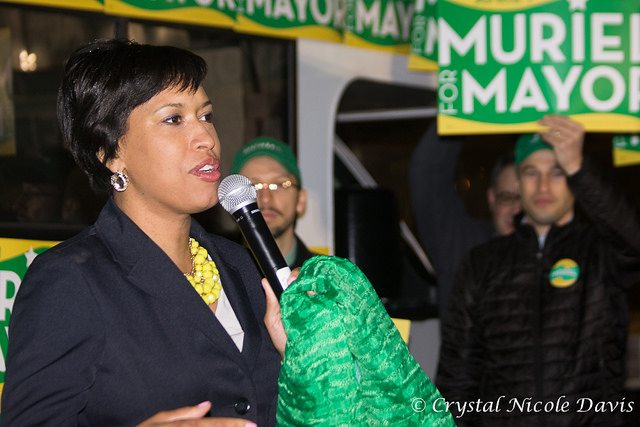The results of the District’s April 1 election leave District residents with plenty of questions about who the city’s next leaders will be, and how they will shape the city’s homeless programs.
Mayor Vincent Gray was defeated in his bid to hold onto his seat. Ward 4 Council member Muriel Bowser captured the Democratic mayoral primary by a wide margin, garnering 44.3 percent of the votes and winning Wards 1, 2, 3, 4 and 6. Bowser is expected to face off against Independent candidate David Catania, who is an at-large city council member, in November.
While Catania is considered a serious contender against Bowser, the elected Democratic mayoral candidate has gone on to become mayor in every single city race since 1975.
Bowser framed herself as the candidate most likely to offer the city fresh solutions after Gray’s tenure, which was overshadowed by an ongoing federal investigation into the financing of his 2010 campaign. “I will run a campaign of integrity, and vision, and energy and inclusion,” Bowser said at her victory party, in a quote obtained by USA Today. “I promise that the values of our campaign will reflect the collective values of those of us in all eight wards.”
In the final days of the 2014 race, federal prosecutors said Gray had been aware of a secret funding scheme hatched by a local businessman, Jeffrey E. Thompson, who has pleaded guilty to conspiracy charges. Five other members of Gray’s campaign staff have pleaded guilty, though Gray himself maintains his innocence.
Going forward as a lame-duck, Gray states that he is proud of his accomplishments, including the reduction of unemployment within the city, the increase in funding for the Permanent Supportive Housing program from $9.4 million to $21.4 million, a $187 million investment in affordable housing production and the creation of 430 permanent supportive housing units.
“The amount of what we’ve done in the last three-and-a-quarter years has been nothing short of phenomenal,” Gray said in an interview with National Public Radio. “We’ve got nine more months. We’ve got a long time.”
Still on Gray’s agenda regarding homelessness is passing his proposed city budget for Fiscal Year 2015, which includes funding targeted at moving 500 homeless families into apartments, increasing welfare payments for needy families and building and preserving affordable housing. Gray is also expected to work with Councilmember Jim Graham’s CCNV (Community of Creative Non-Violence) Shelter Task Force, a committee that is weighing the future of the aging 1350 bed shelter near Judiciary Square. Graham’s CCNV Task Force has been charged with drawing up a set of recommendations about the shelter to be passed on to the mayor. But Graham acknowledged in an April 8 interview that he could not predict whether the city’s next mayor will honor the recommendations of the task force.
Graham was another casualty of the April 1 primary, losing the race for the Democratic nomination for the Ward 1 council seat to neighborhood activist and former Advisory Neighborhood Commissioner Brianne Nadeau.
As chairperson of the city council’s human services committee, Graham has earned a reputation as an advocate for shelter and housing programs. Less is known about Nadeau’s ideas about guiding homeless policies.
It is also unclear where both Bowser and Catania stand on the issue of homelessness. Bowser has attended homeless rallies in the past, recently attending the Housing For All NOW rally at Calvary Baptist Church on Feb. 1, where she fielded questions from the crowd. She rose to prominence as a protege of former DC Mayor Adrian Fenty, who is remembered by homeless advocates both for the controversial decision to close the Franklin School shelter in downtown Washington and as a proponent of a Housing First program that has moved over 1,000 homeless individuals and families into apartments.
Bowser has said she will also stress Housing First, in an effort to ease family homelessness in the District.
“I will work to quickly identify affordable apartments in a timelier manner for families experiencing homelessness,” Bowser said. “I support a housing first approach, not a shelter for the night approach.”








